taxis
Latest
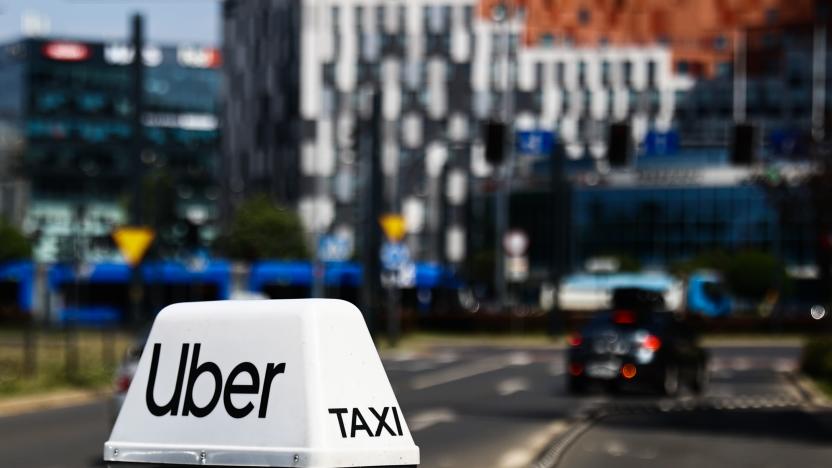
Uber partners with LA taxi companies to expand its fleet
Uber has partnered with Los Angeles Yellow Cab and other SoCal affiliates to offer riders yellow cabs in place of standard ridesharing cars.
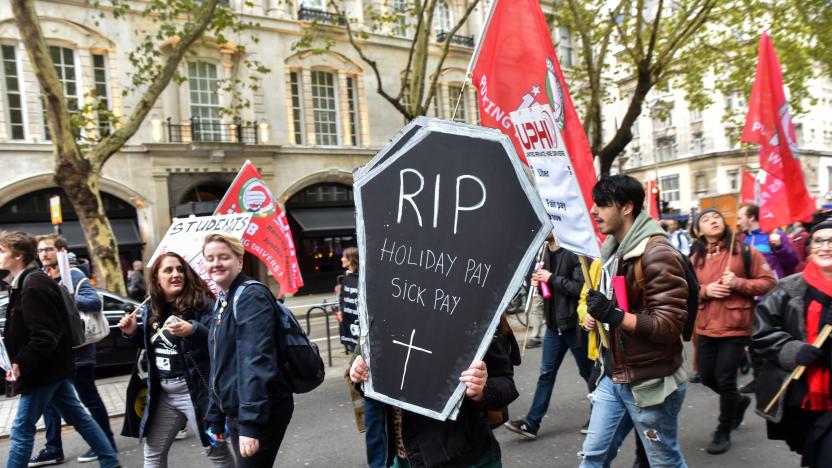
UK will investigate Uber’s plan to buy British rival Autocab
The UK wants to take a look at Uber's plan to buy its major rival, Autocab.

Uber works with NASA to get flying taxis ready by 2020
They say the best revenge is living well, and so in the midst of its ongoing and messy breakup with London, Uber has proven it's doing just fine thank you very much by signing an agreement with NASA to develop software for its proposed flying taxi project, Elevate.
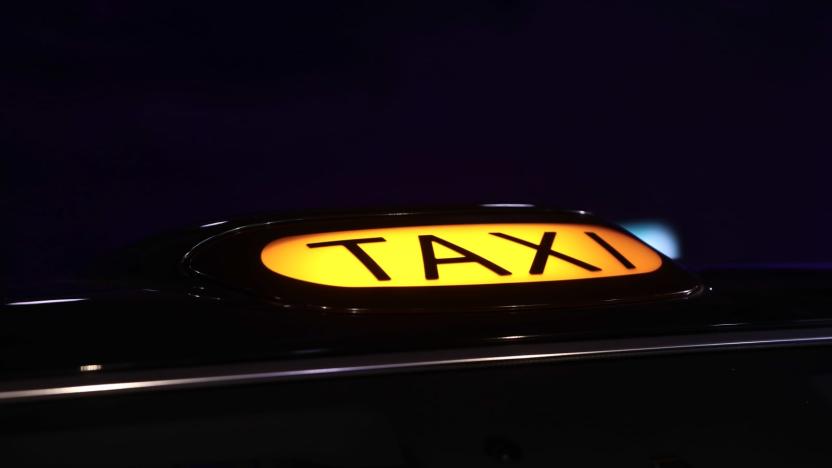
Britain's taxi industry will use Uber's playbook against it
My adopted city is pretty forward-looking, but it was still a surprise when local taxi operations, as one, began offering their own Uber-style apps. It's a phenomenon that's occurring across the UK, with smaller outfits suddenly adopting app- and cloud-based booking systems. But the company that's pushing the change isn't doing so just to make it easier for folks in far-flung cities to book a ride home. Instead, it's the first step in a plan to unite the taxi industry in building a credible, singular rival to Uber.

Another startup promises self-driving taxis 'soon'
Popular online learning service Udacity already trains engineers for work in the fast-growing autonomous vehicles field, but now the company is ready to harness all that talent and launch its own self-driving taxi company. Led by CEO (and former Udacity Vice President) Oliver Cameron, the new spin-off company will be called Voyage and has given itself the goal of getting autonomous taxis to "real users" in less than five years.

Mexico City's new hybrid taxis have a 'panic' button
While President Trump continues to claim Mexico will pay for his big, beautiful wall, our neighbors south of the border are busy spending money on making their largest city safer and less polluted. The Mayor of Mexico City, Miguel Ángel Mancera, has revealed new hybrid-electric taxis that feature WiFi and a "panic" button for passengers. When activated, officials will be alerted of your location and help could be sent immediately in case of an emergency. It's similar to what Uber started offering a couple of years ago in India, with the main difference being that the ridesharing service's panic button is built into its app.

Study shows Uber created some new taxi jobs, but hurt wages
One of the taxi industry's biggest complaints against its competition at ridesharing companies like Uber in Lyft is the idea that these newcomers have been siphoning away jobs from regularly employed taxi drivers. According to a new study of data from the US Bureau of Labor Statistics, however, that was not actually the case.

MIT: Carpooling services could replace most NYC cabs
Researchers have proved mathematically what you probably already knew: Carpooling services are more efficient, less polluting and less costly than traditional taxis. Using data from three million New York City taxi rides, a team from from MIT's CSAIL computer science lab found that just 3,000 vehicles from services like UberPOOL and Lyft Line could replace NYC's 14,000 strong cab fleet. What's more, they'd reduce congestion by three times, barely impact travel times, and you'd only have to wait an average of 2.7 minutes for a ride.
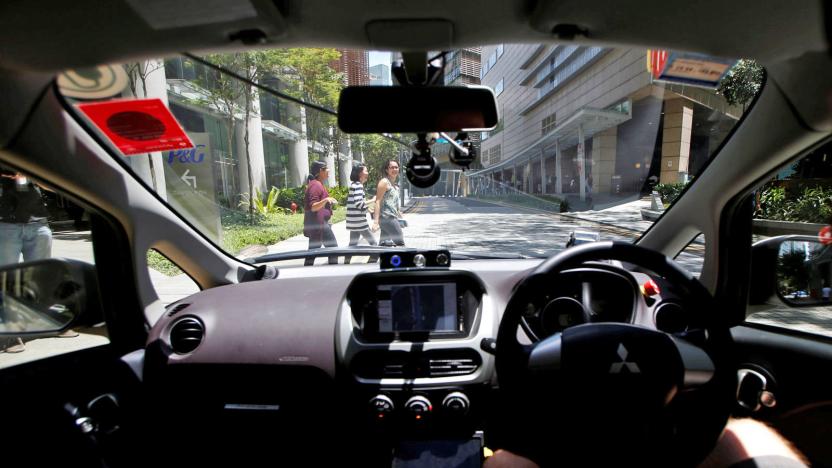
The first self-driving taxis are cruising around Singapore
Uber announced that it will start self-driving trials in Pittsburgh later this month, but it was beat to the punch by a much less well-known company. Starting today, nuTonomy will offer rides to Singapore residents in specially equipped Mitsubishi i-MiEV or Renault Zoe electric vehicles. As with Uber, passengers won't be alone with a robotic driver like Silicon Valley's hapless Jared. A nuTonomy engineer will be along to monitor the vehicle, and a safety driver will "assume control if needed to ensure passenger comfort and safety," the company wrote.

Uber shuts down its app in Paris to support driver protest
Uber will suspend its service in Paris today between 11 AM and 3 PM in support of a driver protest against proposed legislation from the French government. So far, the company has distanced itself from the conflict, but said it will shut down its app in support of its Paris drivers, the first time it has ever done so. The issue, of course, is about private chauffeur services and apps like Uber versus traditional taxis. The government banned the UberPop service last year, so there are no longer concerns over non-professional drivers. However, it now wants to stop a group of minicab chauffeurs from using Uber and other apps.

NYC considering GPS-based meters for taxis, on top of nixing TVs
We've already heard that New York City is considering killing those annoying backseat Taxi TV screens, now it looks like the digital fare meter, along with the mechanical method for tracking ride distance, may also be on the way out. Regulators last night approved a pilot program for a new GPS-based distance tracking system for cabs, which would display fare information on a large tablet, the Wall Street Journal reports. That device would also house the cab's credit card reader and GPS system, and it could also deliver the same news and entertainment programming as the current cab TV sets. Ultimately, it would replace five separate pieces of gear cabs currently require. The year-long pilot program will only hit around 1,000 cabs, out of the city's 13,600 yellow taxis. Previously, regulators were considering testing it in around 4,000 cabs, but it scaled the program back after concerns from advocates for the visually impaired, who use the current TV sets for alerts. (Of course, that's also something a more modern tablet could eventually help with.)

Uber is betting $1 billion to expand in India
Uber has big plans for India -- specifically, $1 billion worth. The taxi-hailing company announced last night that it would make the investment to expand its ridership in India to 1 million rides per day by 2016. Currently, estimates put Uber at around 200,00 daily rides in India, according to the Financial Times. Just like it has in the US and other markets, the company likely aims to use the funding to entice both drivers and riders to join its service. It also helps Uber compete against local competition -- in India's case, that's Ola, which has already raised $400 million on its own. Uber's Indian investment is on par with the $1 billion it plans to spend in China this year. Uber has also had to deal with controversy in India: A sexual assault by a driver last year led to New Delhi temporarily banning the service, forcing Uber to launch a panic button allowing riders to get help from local authorities.

Uber defiant in the face of French ridesharing crackdown
French Interior Minister Bernard Cazeneuve today launched a legal action to permanently shut down UberPOP, Uber's non-professional ride service, according to Reuters. The move follows a protest against UberPOP by as many as 3,000 taxi drivers that crippled large sections of the city and both airports. Seven police officers were injured, 70 vehicles damaged and 10 people arrested during the rally. Yesterday, French authorities ordered police to ban UberPOP and seize driver's cars if necessary. However, Uber's general manager in France replied that the measures "changed nothing," and that UberPOP would continue to operate.

Maaxi lets you share a taxi across London with up to five strangers
Uber is still pushing for world domination, but in London regular black cabs are still one of the most popular ways to get around town. Ride-sharing is also on the rise, but Uber is yet to launch either UberPool or UberPop in Britain. Spotting a gap in the market, newcomer Maaxi is launching a similar offering with the aid of regular black cabs. The app lets you book individual seats, which means you can share your journey with up to five people in order to cut down your fare. Maaxi says, at least to begin with, it'll be focusing on journeys that follow public transport routes. Drivers will deviate for specific pick-ups and drop-offs, but the idea is to focus on the areas of London with the highest demand from passengers. After all, this kind of service will likely thrive or die based on the number of people using it -- if you find yourself travelling solo for most journeys, the app's key selling point is moot.

How to be smart about Uber and Lyft's surge pricing
Uber and Lyft's universally-hated surge pricing model, which drives fares up depending on rider demand, will once again help ring in the New Year. And don't be surprised if that leads to plenty of social media kvetching. If you don't want to be that person surprised by an unexpectedly bill along with your morning hangover, there are a few preventative measures you can take. Just like it did last year, Uber warned users with an email and blog post about tonight's inevitable surge pricing. If you want to take a regularly-priced Uber, your best bet is ordering a car before 12:30am, or after 2:30 am. And that timing would likely make sense for Lyft as well, which didn't offer any advice about how to avoid higher rates. The easiest way to avoid surge pricing is indeed the most obvious: Think ahead to avoid the crowds. Or, you know, take a normal cab or public transportation. (Flywheel is also running a $10 flat-rate promotion for standard cabs in some West Coast cities.)
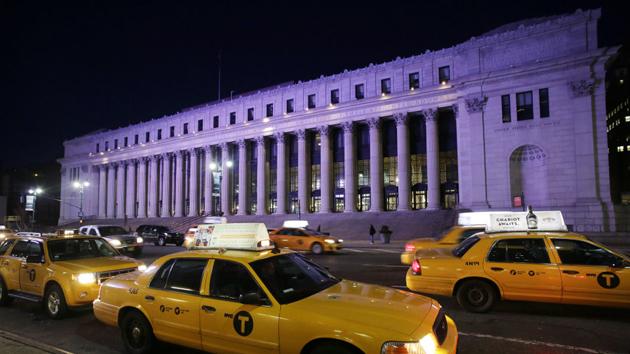
Ridesharing apps are erasing the value of taxi services
It's no surprise that ridesharing outfits like Lyft and Uber are disrupting the taxi business through lower pricing and technological advantages. However, it's now clear that these app-based upstarts are also hitting taxis where it really hurts: the value of owning a taxi service. A New York Times analysis reveals that the prices of medallions, which are necessary to operate taxi fleets in numerous US cities, have plunged sharply in the past year. In Boston, Chicago and New York City, the price of a medallion has fallen between 17 to 20 percent. Ridesharing is affecting how often cities and owners can sell medallions, too. Philadelphia is cutting prices just to sell these items at all, and half of New York's recent sales (a mere 10) were foreclosures -- the former owners just couldn't afford to stay involved.

Amazon is exploring taxi deliveries in San Francisco and Los Angeles
Amazon is reportedly testing taxis to help speed up its delivery service, which is sadly not nearly as cool as drones. According to the Wall Street Journal, the online retail giant is using Flywheel's taxi service for one-hour deliveries in Los Angeles and San Francisco. Sources say Amazon is also considering more ways to tap into taxi deliveries. It's unclear when and if it'll expand beyond those two markets. The news isn't exactly surprising. Amazon will need as many methods as possible to make the dream of one-hour deliveries a reality. We're also seeing plenty of startups like Deliv and Postmates offering retailers and consumers ways to get whatever they need quickly (often within an hour). It's also competing with Google and eBay when it comes to same-day deliveries. And we're sure Amazon is paying close attention to the mistakes of its competitors, given that eBay's entry is essentially dead. [Photo: Mike Seyfang/Flickr]

The Uber effect: how San Francisco's cab use dropped 65-percent
Hailing a ride has never been easier -- just take out your phone, tap on an app and wait for your internet-wrangled chauffeur to arrive. Companies like Uber and Lyft are reinventing the transportation industry, and traditional taxi services are feeling it. According to Kate Toran, interim Taxis and Accessible Services director for the San Francisco Municipal Transportation Agency, the average taxi is only making about 504 trips per month. Two years ago (specifically, in March of 2012) the average trip per taxi averaged at 1,424.

What you need to know about Uber, Lyft and other app-based car services
For the first time last month, I requested a car using a smartphone. The app correctly guessed my location using GPS, gave me a ballpark arrival time with a real-time map and even estimated the fare. A polite driver arrived on time and whisked me to my destination. When I tried to pay and tip, he explained that the payment was already taken (I'd receive a receipt by email soon) and that the service (Uber) forbade tipping. Wait, what? No haggling, luggage fee, credit card refusal, time wasted on receipts or even tipping? This was an epiphany! But professional taxi drivers who pay thousands of dollars for a license are understandably not thrilled about these services. Neither are many cities (and regions) that collect those fees and say that Uber/Lyft/etc. are dangerous or improperly insured. The result of this clash, thus far, is chaos: bans, mass demonstrations and even violence. Despite all that, ridesharing poster child Uber was recently valued at $17 billion. So, will app-driven car services gain traction or be run out of town?

Scientists are trying to help taxis beat Uber at its own game
Taxi companies aren't pleased with Uber and Lyft, but they could be making way better use of ride-sharing technology themselves, according to researchers. A study by MIT and Fujitsu examined why cabs are usually underutilized, but never available during surge periods when you need them. To combat that, they developed on-demand tech that automatically assigns vehicles three possible operating states: taxi, ride-sharing and fixed-route modes. Customers could choose one of those when they order a ride, and immediately receive the boarding times and fares, which would vary by mode. That could save passengers a lot of money, and a test on Tokyo roads resulted in operators making 80 percent more profits too. Fujitsu's goal is to see it operating in Tokyo by 2016, but it might take some convincing to get it adopted more widely. Still, why not beat the upstarts at their own game?








